18世纪英国文学
18世纪英国文学的特点
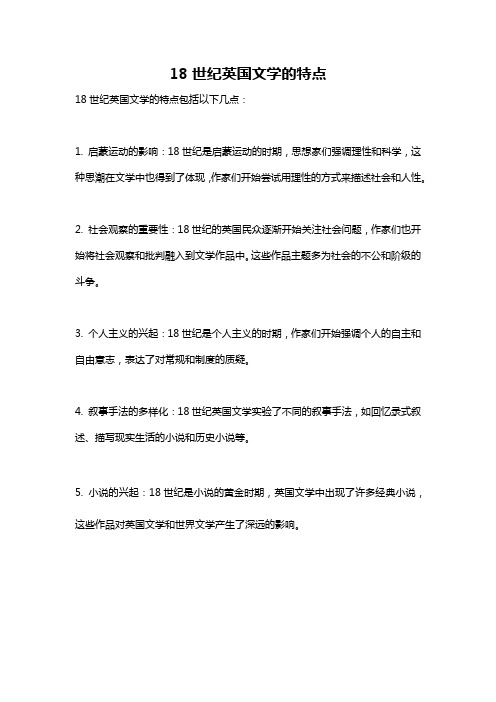
18世纪英国文学的特点
18世纪英国文学的特点包括以下几点:
1. 启蒙运动的影响:18世纪是启蒙运动的时期,思想家们强调理性和科学,这种思潮在文学中也得到了体现,作家们开始尝试用理性的方式来描述社会和人性。
2. 社会观察的重要性:18世纪的英国民众逐渐开始关注社会问题,作家们也开始将社会观察和批判融入到文学作品中。
这些作品主题多为社会的不公和阶级的斗争。
3. 个人主义的兴起:18世纪是个人主义的时期,作家们开始强调个人的自主和自由意志,表达了对常规和制度的质疑。
4. 叙事手法的多样化:18世纪英国文学实验了不同的叙事手法,如回忆录式叙述、描写现实生活的小说和历史小说等。
5. 小说的兴起:18世纪是小说的黄金时期,英国文学中出现了许多经典小说,这些作品对英国文学和世界文学产生了深远的影响。
英国文学——18世纪概述

启蒙时期文学(17世纪后期—18世纪中期)1688年的“光荣革命”推翻复辟王朝,确定了君主立宪制,建立起资产阶级和新贵族领导的政权,英国从此进入一个相对安定的发展时期。
18世纪初,新古典主义成为时尚。
新古典主义推崇理性,强调明晰、对称、节制、优雅,追求艺术形式的完美与和谐。
亚历山大·蒲柏(Alexander Pope, 1688-1744)是新古典主义诗歌的代表,他模仿罗马诗人,诗风精巧隽俏,内容以说教与讽刺为主,形式多用英雄双韵体,但缺乏深厚感情。
18世纪英国散文出现繁荣,散文风格基本建立在新古典主义美学原则之上。
理查德·斯梯尔(Richard Steele, 1672-1729)与约瑟夫·艾迪生(Joseph Addison, 1672-1719)创办《闲谈者》(Tatler)与《观察者》(Spectator)刊物,发表了许多以当时社会风俗、日常生活、文学趣味等为题材的文章,他们清新秀雅、轻捷流畅的文体成为后人模仿的典范。
乔纳森·斯威夫特(Jonathan Swift, 1667-1745)是英国文学史上最伟大的讽刺散文作家,他的文风纯朴平易而有力。
斯威夫特的杰作《格列佛游记》(Gulliver's Travels)是一部极具魅力的儿童故事,同时包含着深刻的思想内容。
作者通过对小人国、大人国、飞岛国、慧马国等虚构国度的描写,以理性为尺度,极其尖锐地讽刺和抨击了英国社会各领域的黑暗和罪恶。
塞缪尔·约翰逊(Samuel Johnson, 1709-1784)是18世纪英国人文主义文学批评的巨擘,《莎士比亚戏剧集序言》(The Preface to Shakespeare)和《诗人传》(Livesof the Poets)是他对文学批评作出的突出贡献。
他从常识出发,在某些方面突破了新古典主义的框框,不乏真知灼见。
约翰逊的散文风格自成一家,集拉丁散文的典雅、气势与英语散文的雄健、朴素于一体。
18世纪英国文学的趋势

18世纪英国文学的趋势
18世纪是英国文学发展的重要阶段,其中出现了一些明显的趋势和特点。
以下是一些重要的趋势:
1. 古典主义:18世纪英国文学受到古典文学的强烈影响,特别是古希腊和罗马文学。
作家们研究和模仿古典作品的风格和主题,追求文学的严谨和规范性。
2. 启蒙思想:18世纪是启蒙时代的全盛期,思想家们强调理性和科学的重要性,反对迷信和专制。
这种思潮在文学中也有所体现,作家们开始关注社会问题、人权和个人自由。
3. 社会批判:18世纪英国社会出现了巨大的变革,人们开始对社会问题展开批判。
一些作家,如塞缪尔·理查森和亨利·菲尔丁,通过小说探讨了社会阶级、性别和家庭关系等问题。
4. 英国浪漫主义:18世纪末,浪漫主义逐渐兴起,对理性主义和古典主义的反叛开始显露。
浪漫主义作家,如威廉·华兹华斯和塞缪尔·柯勒律治,强调个人情感和自然的力量。
5. 小说的兴起:18世纪是英国小说发展的重要时期。
小说成为一种流行的文学形式,作家们开始创作长篇小说,如丹尼尔·笛福的《鲁滨逊漂流记》和简·奥斯汀的《傲慢与偏见》。
6. 诗歌的转变:18世纪的英国诗歌呈现出一种转变,由古典的形式
和主题向更加个人化和自由的方向发展。
诗人们开始关注个人情感和自然景观,并采用更加自由的诗体,如威廉·布莱克的无韵诗。
总的来说,18世纪英国文学在古典主义和启蒙思想的影响下,开始关注社会问题和个人情感,同时也为后来浪漫主义和小说的兴起铺平了道路。
18世纪英国文学的主要成就

18世纪英国现实主义文学
小说是18 世纪英国文学最主要的贡献.在古典主义盛行时期,史诗和悲剧才是正统文学作品的形式.小说是随着中产阶级的兴起而兴起的新的文体.西班牙的“流浪汉小说”、骑士传奇、意大利的以《十日谈》为代表的短篇故事、英国的描写下层人物冒险经历的故事和人物特写,都是形成近代小说的重要因素.
特点是:①它偏重对现实的客观的、具体的、历史的描写,强调人物和环境之间的现实关系.
②典型是现实主义创作的核心.典型化和个性化不可分割,每个典型又是“这一个”.③具有强烈的批判性或揭露性,特别注重描绘社会的黑暗和丑恶现象,以及社会下层、“小人物”的悲惨遭遇.④在艺术形式和表现手法上,以生活本身的形式反映生活为其基本形式,但不局限于这一形式.它具有广阔的审美可能性,不排除采用假定、夸张、荒诞、变形、意识流等多种手法.它重视社会分析,包括心理分析.探索人的复杂内心世界的心理描写,是它的艺术特征之一.
⑤思想基础一般为资产阶级的人道主义.谴责社会黑暗,同情下层人民的苦难与不平等地位,但一般未触及社会矛盾和现实关系的真正根源.
成就:①笛福与《鲁滨逊飘流记》;②斯威夫特与《格列佛游记》;③理查生与《克拉丽莎》;
④菲尔丁与《汤姆.琼斯》.。
十八世纪英国文学概述
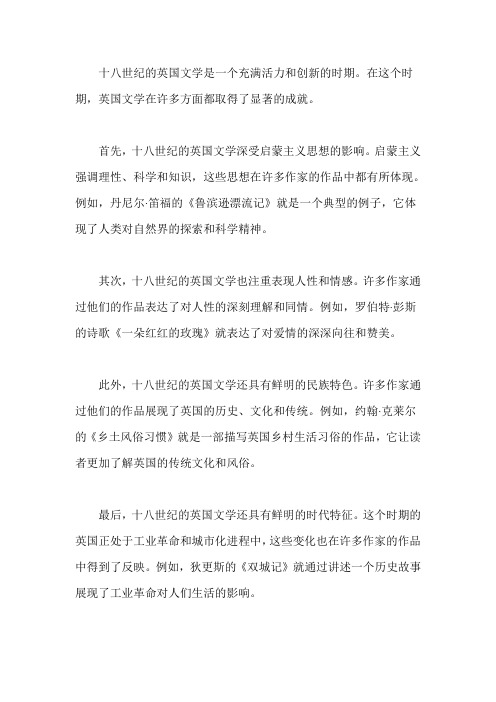
期,英国文学在许多方面都取得了显著的成就。
首先,十八世纪的英国文学深受启蒙主义思想的影响。
启蒙主义强调理性、科学和知识,这些思想在许多作家的作品中都有所体现。
例如,丹尼尔·笛福的《鲁滨逊漂流记》就是一个典型的例子,它体现了人类对自然界的探索和科学精神。
其次,十八世纪的英国文学也注重表现人性和情感。
许多作家通过他们的作品表达了对人性的深刻理解和同情。
例如,罗伯特·彭斯的诗歌《一朵红红的玫瑰》就表达了对爱情的深深向往和赞美。
此外,十八世纪的英国文学还具有鲜明的民族特色。
许多作家通过他们的作品展现了英国的历史、文化和传统。
例如,约翰·克莱尔的《乡土风俗习惯》就是一部描写英国乡村生活习俗的作品,它让读者更加了解英国的传统文化和风俗。
最后,十八世纪的英国文学还具有鲜明的时代特征。
这个时期的英国正处于工业革命和城市化进程中,这些变化也在许多作家的作品中得到了反映。
例如,狄更斯的《双城记》就通过讲述一个历史故事展现了工业革命对人们生活的影响。
时期的英国文学在许多方面都取得了显著的成就,为世界文学的发展做出了重要贡献。
18世纪英国诗歌的特点

18世纪英国诗歌的特点有:
1.内容丰富:18世纪的英国诗歌涵盖了广泛的题材,包括爱情、
自然、历史、宗教等多个领域,反映了当时社会的各个方面。
2.形式多样:18世纪的英国诗歌形式多样,包括抒情诗、叙事诗、
哲理诗等,每种形式都有其独特的表达方式和艺术魅力。
3.情感真挚:18世纪的英国诗歌情感真挚,诗人善于表达自己的
情感和感受,通过诗歌传达出对生活的热爱和对人性的探索。
4.语言简练:18世纪的英国诗歌语言简练,诗人善于运用简练的
语言表达深刻的含义,使诗歌具有高度的艺术感染力。
总之,18世纪英国诗歌的特点是内容丰富、形式多样、情感真挚、语言简练,这些特点使得18世纪的英国诗歌成为了世界文学宝库中的重要组成部分。
十八世纪英国文学的分类

十八世纪英国文学的分类十八世纪是英国文学的黄金时期,这一时期涌现出了许多杰出的作家和作品。
这些作品被广泛地分为几类,如小说、诗歌、戏剧等。
以下是对十八世纪英国文学的分类的探究。
一、小说在十八世纪,小说成为了最为流行的文学形式。
小说包含了丰富的内容和不同的风格。
其中,浪漫小说和现实主义小说是最为流行的两种类型。
浪漫小说通常描写一些奇异的事件和情节,其中最著名的作品是简·奥斯汀的《傲慢与偏见》和《理智与情感》。
这些小说通常描写了一个女性主角的故事,她在不同的环境中经历了各种各样的情感和爱情。
现实主义小说则更加注重现实生活中的事件和情节,其中最著名的作品是丹尼尔·笛福的《鲁滨逊漂流记》。
这些小说通常描写了一个男性主角的故事,他在不同的环境中经历了各种各样的挑战和困境。
二、诗歌十八世纪的诗歌涵盖了许多不同的流派,包括浪漫主义、启蒙主义和古典主义。
其中最著名的作品是威廉·华兹华斯的《悼念诗》和约翰·基茨的《抒情诗集》。
浪漫主义诗歌通常描写一些浪漫和情感的主题,如爱情、自然和宗教。
这些诗歌通常使用比喻和象征来表达作者的情感和思想。
启蒙主义诗歌则更加注重理性和科学的主题,如自然、人类和社会。
这些诗歌通常使用清晰和明确的语言来表达作者的观点和思想。
古典主义诗歌则更加注重传统和历史的主题,如希腊和罗马神话。
这些诗歌通常使用优美和华丽的语言来表达作者的情感和思想。
三、戏剧十八世纪的戏剧涵盖了许多不同的类型,包括喜剧、悲剧和历史剧。
其中最著名的作品是威廉·莎士比亚的《哈姆雷特》和奥利弗·戈德史密斯的《船长》。
喜剧通常描写一些轻松和幽默的主题,如爱情和友谊。
这些戏剧通常使用滑稽和夸张的手法来吸引观众的注意力。
悲剧则更加注重人性的悲剧和悲惨的结局,如爱情和家庭。
这些戏剧通常使用严肃和深刻的手法来表达作者的情感和思想。
历史剧则更加注重历史和政治的主题,如战争和国家。
英国文学
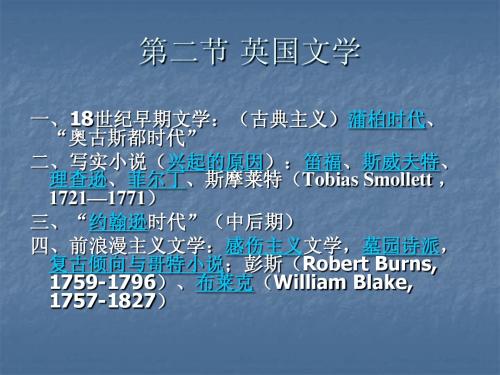
约翰逊时代
约翰逊, 约翰逊,Samuel Johnson, 170917091784 鲍斯威尔, James Boswell, 1740-1795
18世纪英国文坛 世纪英国文坛 盟主,诗人, 盟主,诗人,批评 传记家. 家,传记家.历经 8年之久独自编撰 年之久独自编撰 英文辞典》 了《英文辞典》, 奠定了其声誉.编 奠定了其声誉. 辑《莎士比亚戏剧 集》.晚年代表作 诗人传》 《诗人传》.
小说的兴起
随着现代工商业的发展而产生和壮大起来的中产阶级需要 用一定的文学形式反映他们的观念和要求, 用一定的文学形式反映他们的观念和要求,而小说正生逢 其时地担当了这一重任. 其时地担当了这一重任. 17世纪以来 历史,传记,游记,日记, 世纪以来, 从17世纪以来,历史,传记,游记,日记,人物特写和期 刊文论等散文体裁的发展都为小说提供了有利的文学条件. 刊文论等散文体裁的发展都为小说提供了有利的文学条件. 妇女的参与. 妇女的参与.现代化生产的发展剥夺了妇女原来在家里做 手工或在作坊里劳动的机会,她们大多受过一定教育,是 手工或在作坊里劳动的机会,她们大多受过一定教育, 小说的理想读者. 小说的理想读者. 印刷和出版业的发展. 印刷和出版业的发展.
第二节 英国文学
一,18世纪早期文学:(古典主义)蒲柏时代, 18世纪早期文学:(古典主义 蒲柏时代, 世纪早期文学:(古典主义) 奥古斯都时代" "奥古斯都时代" 写实小说(兴起的原因):笛福,斯威夫特, ):笛福 二,写实小说(兴起的原因):笛福,斯威夫特, 理查逊,菲尔丁,斯摩莱特( 理查逊,菲尔丁,斯摩莱特(Tobias Smollett , 1721—1771) 1721—1771) 约翰逊时代 时代" 中后期) 三,"约翰逊时代"(中后期) 前浪漫主义文学:感伤主义文学 墓园诗派, 文学, 四,前浪漫主义文学:感伤主义文学,墓园诗派, 复古倾向与哥特小说;彭斯( 复古倾向与哥特小说;彭斯(Robert Burns, 1759-1796),布莱克( 1759-1796),布莱克(William Blake, ),布莱克 1757-1827) 1757-1827)
英国文学的兴起
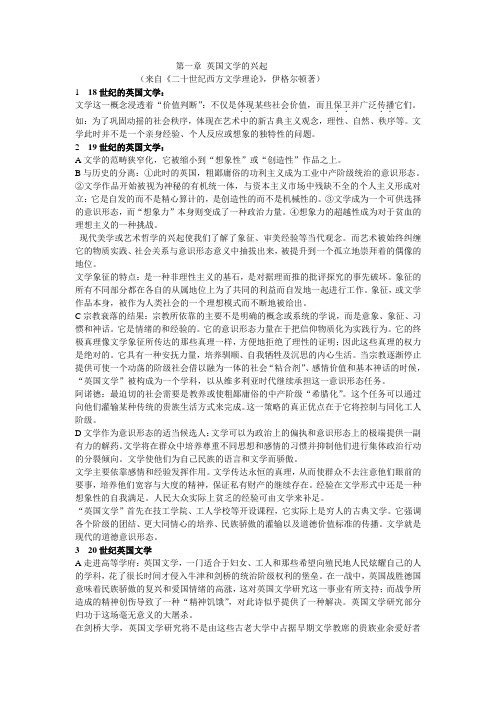
第一章英国文学的兴起(来自《二十世纪西方文学理论》,伊格尔顿著)1 18世纪的英国文学:文学这一概念浸透着“价值判断”:不仅是体现..它们。
..并广泛传播..某些社会价值,而且保卫如:为了巩固动摇的社会秩序,体现在艺术中的新古典主义观念,理性、自然、秩序等。
文学此时并不是一个亲身经验、个人反应或想象的独特性的问题。
2 19世纪的英国文学:A文学的范畴狭窄化,它被缩小到“想象性”或“创造性”作品之上。
B与历史的分离:①此时的英国,粗鄙庸俗的功利主义成为工业中产阶级统治的意识形态。
②文学作品开始被视为神秘的有机统一体,与资本主义市场中残缺不全的个人主义形成对立:它是自发的而不是精心算计的,是创造性的而不是机械性的。
③文学成为一个可供选择的意识形态,而“想象力”本身则变成了一种政治力量。
④想象力的超越性成为对于贫血的理想主义的一种挑战。
现代美学或艺术哲学的兴起使我们了解了象征、审美经验等当代观念。
而艺术被始终纠缠它的物质实践、社会关系与意识形态意义中抽拔出来,被提升到一个孤立地崇拜着的偶像的地位。
文学象征的特点:是一种非理性主义的基石,是对据理而推的批评探究的事先破坏。
象征的所有不同部分都在各自的从属地位上为了共同的利益而自发地一起进行工作。
象征,或文学作品本身,被作为人类社会的一个理想模式而不断地被给出。
C宗教衰落的结果:宗教所依靠的主要不是明确的概念或系统的学说,而是意象、象征、习惯和神话。
它是情绪的和经验的。
它的意识形态力量在于把信仰物质化为实践行为。
它的终极真理像文学象征所传达的那些真理一样,方便地拒绝了理性的证明;因此这些真理的权力是绝对的。
它具有一种安抚力量,培养驯顺、自我牺牲及沉思的内心生活。
当宗教逐渐停止提供可使一个动荡的阶级社会借以融为一体的社会“粘合剂”、感情价值和基本神话的时候,“英国文学”被构成为一个学科,以从维多利亚时代继续承担这一意识形态任务。
阿诺德:最迫切的社会需要是教养或使粗鄙庸俗的中产阶级“希腊化”。
18世纪英国文学背景概述
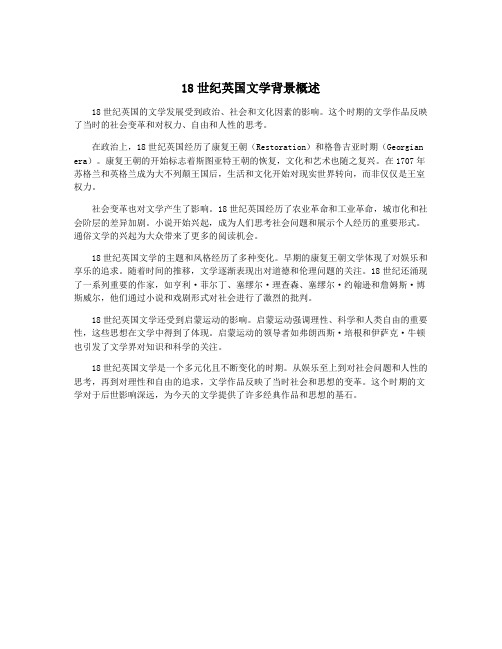
18世纪英国文学背景概述18世纪英国的文学发展受到政治、社会和文化因素的影响。
这个时期的文学作品反映了当时的社会变革和对权力、自由和人性的思考。
在政治上,18世纪英国经历了康复王朝(Restoration)和格鲁吉亚时期(Georgian era)。
康复王朝的开始标志着斯图亚特王朝的恢复,文化和艺术也随之复兴。
在1707年苏格兰和英格兰成为大不列颠王国后,生活和文化开始对现实世界转向,而非仅仅是王室权力。
社会变革也对文学产生了影响。
18世纪英国经历了农业革命和工业革命,城市化和社会阶层的差异加剧。
小说开始兴起,成为人们思考社会问题和展示个人经历的重要形式。
通俗文学的兴起为大众带来了更多的阅读机会。
18世纪英国文学的主题和风格经历了多种变化。
早期的康复王朝文学体现了对娱乐和享乐的追求。
随着时间的推移,文学逐渐表现出对道德和伦理问题的关注。
18世纪还涌现了一系列重要的作家,如亨利·菲尔丁、塞缪尔·理查森、塞缪尔·约翰逊和詹姆斯·博斯威尔,他们通过小说和戏剧形式对社会进行了激烈的批判。
18世纪英国文学还受到启蒙运动的影响。
启蒙运动强调理性、科学和人类自由的重要性,这些思想在文学中得到了体现。
启蒙运动的领导者如弗朗西斯·培根和伊萨克·牛顿也引发了文学界对知识和科学的关注。
18世纪英国文学是一个多元化且不断变化的时期。
从娱乐至上到对社会问题和人性的思考,再到对理性和自由的追求,文学作品反映了当时社会和思想的变革。
这个时期的文学对于后世影响深远,为今天的文学提供了许多经典作品和思想的基石。
18世纪的英国文学

《汤姆·琼斯》的价值就在于用一个烂 熟的套路广泛地描绘了英国的社会生活。
(四)劳伦斯·斯泰恩
斯泰恩是英国感伤主义文学的代表作家, 他的小说对世界文学都有重要的作用,代表 作是《感伤的旅行》。
英国的感伤主义发展到斯泰恩已经形成 一个大的浪潮,感伤主义的名称即因斯泰恩 的小说《感伤的旅行》而确定下来。
很多人认为英国的感伤主义是从理查逊 开始的。
理查逊的小说里也有大量议论的部分。 有些议论被人斥为是“自满自足的中产阶级 的道德说教”。
理查逊小说中细腻的感情分析成为英国 小说中重要的倾向,他还创造了“书信体” 小说。
理查逊小说的整体格调是哀婉的。
(三)亨利·费尔丁
亨利·费尔丁是18世纪英国很有影响的 小说家,他的创作很丰富。最早的小说是 《约瑟·安德鲁斯》,是针对《帕美拉》的 感伤情调写的反讽,费尔丁把它叫做“散文 滑稽史诗”,是对当时以理查逊为代表的作 家创作的一系列感伤小说的讽刺。
(五)约拿旦·斯威夫特
约拿旦·斯威夫特(1667-1745)在文学 史上有独特的地位,代表作是《格列佛游 记》。
《格列佛游记》一共分为四部分:第一 部分叫“小人国”;第二部分叫“大人国”; 第三部分叫“飞岛”和“飞岛的地下部分”, 第四部分叫“慧马国”。
《格列佛游记》第四部分“慧马国”写 的是主人公格列佛漂流到一个孤岛,被一群 野人包围,一匹马把格列佛带到了“慧马 国”。格列佛回到人类社会后,被不相信他 的人关进疯人院。他的妻子让大夫为他做一 个诊断。结果格列佛一见到穿着严肃的医生, 就把他们称为“野人”,认为这些穿着文明 的人和岛上没穿衣服的人是一样的。
18世纪英国文学分类
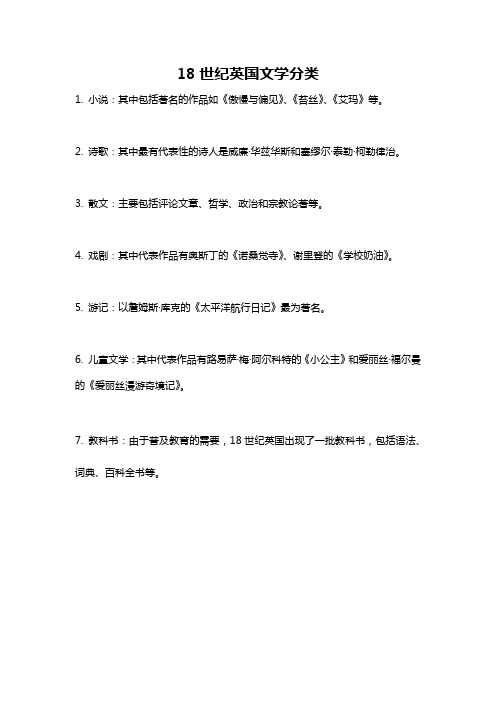
18世纪英国文学分类
1. 小说:其中包括著名的作品如《傲慢与偏见》、《苔丝》、《艾玛》等。
2. 诗歌:其中最有代表性的诗人是威廉·华兹华斯和塞缪尔·泰勒·柯勒律治。
3. 散文:主要包括评论文章、哲学、政治和宗教论著等。
4. 戏剧:其中代表作品有奥斯丁的《诺桑觉寺》、谢里登的《学校奶油》。
5. 游记:以詹姆斯·库克的《太平洋航行日记》最为著名。
6. 儿童文学:其中代表作品有路易萨·梅·阿尔科特的《小公主》和爱丽丝·福尔曼的《爱丽丝漫游奇境记》。
7. 教科书:由于普及教育的需要,18世纪英国出现了一批教科书,包括语法、词典、百科全书等。
18世纪的英国文学

❖Gulliver’s Travels records the pretended four voyages of Gulliver, and his adventures in four strange countries.
❖A Modest Proposal is a more bitter satire on the policy of the English government towards the Irish people.
the guiding principle or slogan is Ration/Reason, natural right and equality
Ration became standard for measurement of everything.
The Enlightenment Movement
❖ 2.The rise of English novel: an important phenomenon of the period.
❖ 3. Gothic novels emerged and flourished in the last decade of the 17th century, which combine both elements of horror and romance.
18世纪英国文学
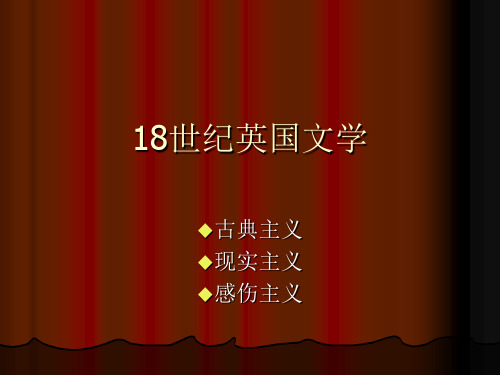
⑤
典型性
现实主义创作方法要求除了细节真实外, 现实主义创作方法要求除了细节真实外,还 要真实地再现典型环境中的典型人物, 要真实地再现典型环境中的典型人物,在小说 《汤姆·琼斯》中,菲尔丁运用对比手法成功塑造 汤姆·琼斯》 了同一类型而不同特点的一系列典型人物
身份的焦虑
英国学者威廉· 英国学者威廉·布洛姆在总结有关身份问题的最 近研究成果时简要概括到: 近研究成果时简要概括到:“身份确认对任何个人 来说, 来说,都是一个内在的、无意识的行为要求,个人 努力设法确认身份以获得心理安全感, 努力设法确认身份以获得心理安全感,也努力设法 维持、保护和巩固身份以维护和加强这种心理安 全感,后者对于个性稳定与心灵健康来说, 全感,后者对于个性稳定与心灵健康来说,有至关重 要的作用。从婴儿期到成年以至老年, 要的作用。从婴儿期到成年以至老年,身份确认这 一行为要求一直发挥着作用“ 一行为要求一直发挥着作用“。而一个人的身份 包括诸多层面,根据荷兰学者吉尔特· 包括诸多层面,根据荷兰学者吉尔特·霍夫斯塔德有 关文化身份的论述, 关文化身份的论述,一个人始终同时属于以下不同 层面或身份标志:如国家层面、地域/种族/信仰/ 层面或身份标志:如国家层面、地域/种族/信仰/语 言层面、性别层面、代的层面、阶级或身世层面、 组织或职业层面等等。
18世纪英国文学 18世纪英国文学
古典主义 现实主义 感伤主义
·知识点
18世纪英国启蒙文学的三个阶段 18世纪英国启蒙文学的三个阶段 现实主义小说的特点 重要作家作品:笛福《鲁滨逊漂流记》 重要作家作品:笛福《鲁滨逊漂流记》※ 斯威夫特《格列佛游记》 斯威夫特《格列佛游记》 理查生《帕米拉》 理查生《帕米拉》 菲尔丁《汤姆·琼斯》 菲尔丁《汤姆·琼斯》※ 斯泰恩《项笛传》 斯泰恩《项笛传》 扬格《夜思》 扬格《夜思》 格雷 《暮畔哀歌》 暮畔哀歌》 哥特式小说 感伤主义及其特点 “暮畔诗派” 暮畔诗派”
18世纪的英国文学
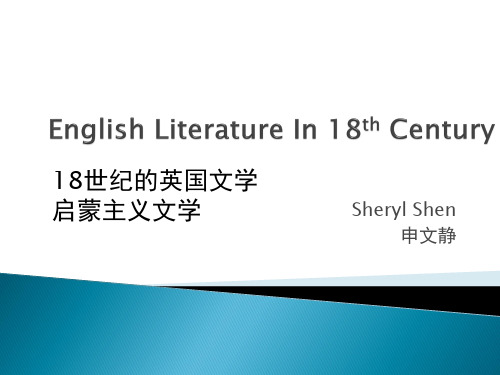
“假如一间铁屋子,是绝无窗户而万难破毁的,里 面有许多熟睡的人们,不久都要闷死了,然而是从 昏睡入死灭,并不感到就死的悲哀。现在你大嚷起 来,惊起了较为清醒的几个人,使这不幸的少数者 来受无可挽救的临终的苦楚,你倒以为对得起他们 么?”
“然而几个人既然起来,你不能说决没有毁坏 这铁屋的希望。”
All partial Evil, universal Good;
And spite of Pride, in erring Reason's spite, One truth is clear: Whatever is, is right (Alexander Pope: An Essay o n Man, To Henry St, John , lines 289~294)
For
ቤተ መጻሕፍቲ ባይዱ
fools rush in where angels fear to tread.
Fools
admire, but men of sense approve.
Why do people have to follow rules?
How do we understand “Those rules of old discover’d, not devis’d/Are Nature still, but Nature methodiz’d”?
A little learning is a dangerous thing. (from An Essay on Criticism)
To
err is human, to forgive, divine.
An
honest man is the noblest work of God.
18世纪英国文学社会历史背景

18世纪英国文学社会历史背景
18世纪英国文学的社会历史背景主要有以下几个方面:
1. 女性权益的觉醒:18世纪初,英国社会对待女性的态度开
始发生变化。
女性开始参与教育和文化领域,对于自身权益的争取也逐渐增加,这对于当时的文学创作产生了积极的影响。
2. 工业革命的兴起:18世纪是英国工业革命的起始阶段,工
业化带来了大规模的城市化和社会变迁。
这种社会变迁对于文学创作提供了丰富的素材,同时也反映了当时社会的不平等和冲突。
3. 绅士文化的兴盛:18世纪的英国社会以绅士文化为主导,
绅士对于文学的热衷和对于教养的要求成为当时文学创作的主要动力。
许多文学作品也通过对绅士的塑造和探讨,表现出当时社会的价值观和道德规范。
4. 政治变革的影响:18世纪初,英国历经了光荣革命和格洛
斯特议会革命,国家政治制度发生了较大的变化。
这些政治变革对于文学创作产生了巨大的影响,作家们开始关注社会政治问题,并用文学作品表达对政治体制的思考和批评。
5. 文化启蒙运动的影响:18世纪的英国是启蒙运动的时代,
启蒙思想家们强调理性、人权和知识的重要性。
这种思潮对文学创作产生了深远的影响,作家们开始关注个体的自由和权益,并试图通过文学来推动社会变革。
总的来说,18世纪英国文学的社会历史背景反映了当时社会的动荡与变迁,以及人们对于个体权益、道德观念和政治体制的关注和思考。
同时,文学作品也成为表达和探讨这些问题的重要途径。
18世纪英国文学

I . Historical BackgroundWith the Glorious Revolution, England became a constitutional monarchy and, the state power passed from the king gradually to the Parliament and the cabinet ministers. Abroad, a vast expansion of British colonies in Asia, Africa and North America, and a continuous increase of colonial wealth and trade provided England with a market for which the small-scale, manual production methods of the home industry were hardly adequate. All these created not only a great demand for large quantities of manufactured goods but also standardized goods made in Britain. This was the basic cause of the Industrial Revolution, of the invention of textile machines and other kinds of machinery.At home in the country, Acts of Enclosure were putting more lands into the hands of fewer privileged rich landowners and forcing thousands of small farmers and tenants off their land to become wage earners in industrial towns. As a result, there appeared a market of free labor anal free capital, thus providing the essential conditions for the rising of Industrial Revolution. So, towards the middle of the 19th century, England had become the first powerful capitalist country, the work-shop of the world, flooding the markets both at home and abroad with itsmanufactured goods.These changes, both political and social, enriched the bourgeoisie and the aristocracy who ruled the country, but brought great miseries to the majority of the people in England, Scotland, and Ireland; and in the colonies. Popular uprisings again and again hit Ireland; in Scotland people were threatening of independence from the British government; and the American people started their War of Independence in 1776 and finally broke away from the British government.As England was growing into a powerful industrial country, it also witnessed the rapid growth of the bourgeois middle class at home. These- were mainly city people: traders, merchants, manufacturers, and other adventurers such as slave-traders and colonists. They became the backbone of the fast developing England. As the Industrial Revolution went on in its full swing, more and more people joined the rank of the middle class. It was a revolutionary class then and quite different from the feudal-aristocratic class. They were the people who had known poverty and hardship, and most of them had obtained their present social status through much hard work. Morally, they stressed the virtues of self-discipline, thrift and hard work. For them, to work and to accumulate wealth constituted the wholemeaning of their life.Ⅱ. Cultural Background1. EnlightenmentThe Enlightenment was a progressive intellectual movement throughout Western Europe in the 18th century. It was an expression of struggle of the bourgeoisie against feudalism. The enlighteners fought against class inequality, stagnation, prejudices and other survivals of feudalism. They thought the chief means for bettering the society was "enlightenment" or "education" for the people. The English enlighteners were bourgeois democratic thinkers. They were different from those of France, for they appeared not before but after the bourgeois revolution. They set no revolutionary aim before them and what they strove for was to carry the revolution through to an end.Most of the English writers were enlighteners. They fell into two groups-the moderate group and the radical group. The more moderate enlighteners supported the principles of the existing social order and considered that partial reforms would be sufficient. In this group may be included chiefly Alexander Pope, Joseph Addison and Richard Steele, Daniel Defoe andSamuel Richardson.The more radical enlighteners struggled for more resolute democratization in the management of the government, and defended the interests of the exploited masses, the peasants and the working people in the cities. The representative writers of this group are Jonathan Swift, Henry Fielding, Tobias George Smollett, Oliver Goldsmith and Richard Brinsley Sheridan.Most of the writers of the moderate group acknowledged that the existing social system of the day was essentially fair and just. On this basis they tried to work out a standard of moral conduct, which could be more suitable to the existing social conditions while the writers of the radical group stressed the discrepancy between what they called "the proper moral standards" and the bourgeois-aristocratic society of their age.2. Cultural ProgressInspired by the spirit of the Enlightenment, people were encouraged to cultivate a sense of rationality and a witty intellectuality. More schools were set up throughout the country so as to provide a better education for the masses. As more people had now more money and more leisure time, and became better educated, a widely distributed reading public grew,especially among the well-to-do middle class women. This demanded more reading materials which would be of interest and satisfy their need for a rational and moral life. Outside regular schools, literary works of all kinds played a decisive role in popularization of general education. The Copyright Act of 1709 made, for the first time in English history, literary creation an honorable and independent profession. Writers like Alexander Pope were able to live a life independent of those rich aristocratic patrons. Along with the economic independence, the eighteenth-century writers enjoyed greater freedom in their creative activities and were now able to devote themselves to whatever interested them and to give utterance to whatever they thought right or proper. For the first time too, the literary tendency of the age was moving-away from the conventional romance stories about the life of the rich and noble people of the aristocratic class and turning to works that would give accounts of the common life of the ordinary folk.Besides the popular forms of poetry, novel and drama, the period also saw the appearance of such popular press as pamphlets and newspapers and periodicals which served as the party mouth-organs as well as an ideal medium for public education. And there was also the flourish of coffee houses andall kinds of social clubs, (about 2000 in London.) which greatly helped the cultivation and promotion of the new English culture.However, in the later part of the century, people began to feel discontented with the rigidity of rationality. A demand for a release of one's spontaneous feeling, a relaxation from the cold and rigid logic of rationality and an escape from, the inhuman Industrial Revolution gradually took shape in the form of sentimental novel and poetry.Ⅲ. Characteristics of the Literature1. A General ViewThe main literary stream of the 18th century was realism. What the writers described in their works were social realities. The main characters were usually common men. Most of the writers concentrated their attention on daily life. In this century the newspaper was born. Literature, which included the book, the newspaper and the magazine, became the chief instrument of the nation's progress. The new social and political conditions demanded expressions not simply in books but more especially in pamphlets, magazines and newspapers. Poetry, which had been the glory of English literature in the preceding ages, was inadequate for such a task. So prose had a rapid development in this age. The 18th century was an age of prose. A group ofexcellent prose writers, such as Addison, Steele, Swift, Fielding, were produced.Novel writing made a big advance in this century. The main characters in the novels were no longer kings and nobles but the common people.In this age satire was much used in writing. It refers to any writing, in poetry or prose, with the purpose to ridicule follies, stupidities,the vices and corruptions of the society, which threatened to be contrary to the maintenance of good moral order and literary discipline. So, it answered well the purpose of the Enlightenment, which aimed at public education in moral, social as well as cultural life. It also proved to be an effective weapon for arguments of all kinds and verbal attacks on enemies of both the parties and the personal. Since there was fierce strife of the two political parties in society, nearly every writer of this century was employed and rewarded by Whigs or Tories for satirizing their enemies. English literature of this age produced some excellent satirists, such as Pope, Swift and Fielding. So, it became the fashion for all forms of writing at the time.The development of the literature in this period can be summarized as: the predominance of neoclassical poetry and prose in the early decades of the 18th century; the rise andflourish of modern realistic novel in the middle years of the 18th century; and the appearance of the sentimental and pre-romantic poetry and fiction in the last few decades of the 18th century.2. Neo-Classicism in English LiteratureNeo-Classicism made a rapid growth and prevailed for the better part of the 18th century. In early 18th century, writers of the neo-classical school were Addison, Steele and Pope. In the middle decades of the century, Samuel Johnson became the leader of the classical school in English poetry and prose.This term mainly applies to the classical tendency which dominated the literature of the early period. It found its artistic models in the classical literature of the ancient Greek and Roman writers, and tried to control literary creation by some fixed laws and rules drawn from their works, for example, rimed couplet instead of blank verse and the three unities of time, place and action,etc. It put the stress on the classical ideals of order, logic, restrained emotion, accuracy, good taste .The English classicists followed these standards in their writings. They tried to make English literature conform to rules and principles established by the great Roman and Greek classical writers. Prose should be precise, direct and flexible. Allthe neo-classicists followed these standards in writing.Alexander Pope (1688-1744)Pope was the representative writer of the neo-classical school. In the field of satiric and didactic verse, he was the undisputed master. His influence completely dominated the poetry of his age. Many foreign writers and the majority of English poets looked to him as their model. His poetry clearly reflected the spirit of the age in which he lived. Pope was a master in satire and heroic couplet. He popularized the neo-classical literary tradition. He was one of the early representatives of the Enlightenment, who introduced into English culture the spirit of rationalism and greater interest in the human world. He represented the highest glory and authority in matters of literary art and made great contributions to the theory and practice of prosody诗学.Pope's Major WorksAn Essay on Criticism, written in heroic couplet, consisting of 744 lines and divided into three parts, was a manifesto of English neo-classicism as Pope put forward his aesthetic theories in it. Pope’s Essay on Criticism was a comprehensive study of theories of literary criticism.Essay on Man, written in heroic couplet, indicates the poet's political and philosophical viewpoint. It deals with man' srelation to the universe, to society, to himself, and to happiness. The Dunciad is Pope' s famous satirical poem. It is full of bitter personal attacks on the poet's personal enemies, and it also gives a broad satirical picture of the whole literary life in the early 18th century England.“A little learning is a dangerous thing.”“Short views we take, nor see the lengths behind.”“Hills peep over hills, and Alps on Alps arise!”Joseph Addison (1672-1719) and Richard Steele (1672-1729) In 1709 Steele started a literary periodical named “The Tatler”. In 1711, Addison collaborated with Steele to create a literary periodical called “The Spectator”."The Tatler" was published three times a week. It became widely read in London, especially in clubs and coffeehouses. The paper became extremely popular because it was just the sort of thing that suited the needs of the reading public among the bourgeoisie. "The Spectator", a daily paper, was a collaborative project by Addison and Steele together. It was much more important than "The Tatler" because it dealt with a wide range of subjects and was written in a maturer style. It offered the models of social and moral behaviour to the new British middle class besides discussing the current affairs and culture issues. Moreover Addison’s prose which is very clear, plain, fluent and elegant became a model for the writers of that time. His style is rich in humor and common sense, which is also imitated by other weiters and exerts a great influence abroad.The most striking features of the paper are the character sketches of Mr. Spectator and the members of his club,and these sketches become the forerunner of the modern Englishnovel.The essays in this periodical had a moral purpose.They attempted to improve manners and morals, and continued to struggle against the ideas of the aristocracy.Steele and Addison’s Contributions to English Literature1) Their writings in “The Tatler” and“The Spectator" provide anew code of social morality for the rising bourgeoisie.2) They give a true picture of the social life of England in the 18th century.3) In their hands, the English essay completely established itself as a literary genre.Using it as a form of character sketching and story-telling, they ushered in the dawn of the modern novel.3. English Realistic NovelsThe rise and growth of the realistic novel is the most prominent achievement in the 18th century English literature. The novelists of this group told the reader in their novels, not about knights or kings but about the ordinary people; about their thoughts; feelings and struggles. The major realist novelists of this century are Daniel Defoe, Jonathan Swift, Henry Fielding and Tobias George Smollett.The early literature in the Medieval or Renaissance period, only served the feudal aristocratic class. Almost all the literary works were about kings, queens, princes, feudal lords and their way of life. Even Shakespeare's plays were dominated by these people. Romance was the typical literary form which was to delight and entertain the aristocrats. But now, after the bourgeois revolution, the English middle-class people were ready to cast away the aristocratic literature of feudalism and to create a new kind of realistic literature of their own to express their ideas and serve their interests. Thus instead of the life of kings and feudal lords, the whole life in its ordinary aspects of the middle class became a major source of interest in English literature. This change of subject matter was most obvious in the new literary form of English realistic novel. Defoe, Richardson, Fielding,Sterne, Goldsmith and Smollett were among the major novelists of the time. They achieved in their works both realism and moral teaching. The influence of their works was very great both at home and abroad. It found impact in some of the great works of European writers and paved the way for the great nineteenth-century realistic writers like Jane Austen, Walter Scott, Charles Dickens and William Thackeray.“The novel is the most important gift of bourgeois, or capitalist, civilization to the world’s imaginative culture.” (Ralph Fox)Daniel Defoe: “Robinson Crusoe”—one of the forerunners of English realistic novelFielding: the real founder of realistic novelF.G. Smollet: his satirical novels touched upon various aspects of English life.Samuel Richardson: “Pamela” psychological an alysis Jonathan Swift: Swift is one of the greatest masters of satire.Daniel Defoe (1660-1731)Defoe was a journalist, a pamphleteer, a poet, and above all these, he was a novelist. He has been regarded as the discoverer of the modern novel.Robinson CrusoeAt the head of Defoe' s works stands his most important work The Life and Strange Surprising Adventures of Robinson Crusoe. It has held its popularity for more than two centuries.The story was based upon the experiences of a Scotch sailor called Alexander Selkirk, who had been marooned on a desert island off the coast of Chile and lived there in solitude for four or five years. After his return to Europe in 1709, his experiences became known. Defoe got inspiration from this real story and with many incidents of his own imagination, he successfully produced the famous novel Robinson Crusoe.The story is told in the first person singular as if it was told by some sailor-adventurer himself. In this novel, Defoe created the image of a colonizer and a foreign trader, who has the courage and will to face hardships, and who has determination to preserve himself and improve his livelihood by struggling against nature. Crusoe represents the English bourgeoisie at the earlier stage of its development. Being a bourgeois writer, Defoeglorifies the hero and defends the policy of colonialism of British government.Features of Defoe's NovelsA. Defoe is remembered chiefly for his novels. The central idea of his novels is that man is good and noble by nature but may succumb to an evil social environment. The writer wants to make it clear that society is the source of various crimes and vices.B. Defos' s intention is that the readers should regard his novels as real stories. For that reason, he deliberately avoids all art, all fine writing, so that the reader should concentrate only on a series of plausible events. Defoe's novels all take the form of memoirs, but everything in them gives the impression of reality.Jonathan Swift (1667-1745)Swift was born in Dublin.The Battle of the Books, and A Tale of a Tub. The former is a satirical dialogue on the comparative merits of ancient and modern writers. The writer influenced by classicism in the literature of the time thought the ancient writers were better than the modern ones. The latter is a prose satire and a sharp attack on the disputes among the different sects of the Christian religion.Among the pamphlets he wrote about Ireland, the best-known pieces are The Drapier' s Letters and A Modest Proposal. The Drapier's Letters were written of the actual social struggle against the debasement of the Irish coin. In the fourth letter, Swift speaks again and again of liberty and slavery in connection with the Irish people. In A Modest Proposal, Swift, with bitter irony, suggests that the poor Irish peasants fatten their one-year-old children and then sell them as food to the rich. This proposal is a most powerful blow at the English government's policy of oppression and exploitation in Ireland. Gulliver' s TravelsThe book contains four parts, each of them deals with one particular voyage of the hero and his extraordinary adventureson some remote island.In the first part, Gulliver goes to sea as a ship's surgeon. In a big storm the ship is wrecked and he is cast upon the shore of the island of Lilliput. The first part is full of references to current politics. Lilliput is the miniature of England. Swift's satire is directed against the English ruling class, the two political parties and the religious disputes.In the second part, Gulliver again goes to sea and his ship is again wrecked in a storm. Gulliver is abandoned on the land of the Brobdingnagians. The Brobdingnagians prove to be superior to the men and women of Gulliver's society in wisdom and humanity as well as in stature. Compared with them, he is very small, insignificant, mean and unworthy. In this part, the King of Brobdingnag is described as a wise and kind king, and the inhabitants are said to be a civilized race. The law of the country is used to defend the natives' freedom and happiness.The third part, which is often considered to be the least interesting, deals with a series of the hero's adventures at several places. The first place that Gulliver gets to is the floating island of Laputa. Gulliver finds out here the king and the noble persons are a group of absent-minded philosophers and astronomers who care for nothing but mathematics and music and who speakalways in mathematical terms of lines and circles. They often do useless research work, for example a scientist makes researches on how to get sunlight from cucumbers. Another scientist is studying how to construct a house by first building the room and then laying the base. Through these descriptions, Swift satirizes the scientists who keep themselves aloof from practical life.In the country of Laputa, the king and his ministers use cruel methods to suppress any rebellion of the people living on the continent below. Whenever the people rise up against them, they make the flying island hover over the place of the rebellion, thus preventing sunlight and rain from reaching it, or let the island drop directly upon the heads of the rebellion people. Here Swift condemns the cruelty of the ruling class to the people.Then Gulliver comes to the island of Sorcerers. This part contains Swift' s sharp satire against all kinds of English social institutions. While condemning the English ruling class, Swift praises the English people, thinking they are honest, brave, and have true love for freedom.The fourth part describes the hero's voyage to the country of the Houyhnhnms and has generally been considered the best part of the book because the satire here is the sharpest and the bitterest.In this part Gulliver is cast upon the shore of the land of the Houyhnhnms, who are horses endowed with reason, and who are the governing class. In this country there is a species of wild animals called Yahoos. The horses are extremely intelligent and noble, and possess all good qualities, while the Yahoos, though in many ways they are like human beings, are low and vile and despicable and no better than beasts. Gulliver praises the life and virtues of the horses and feels disgusted at the Yahoos. When Gulliver returns homes he can't stand the human life there. To him all his countrymen are the hateful Yahoos. This part does not show Swift's hatred and disgust for all the humanity. It just shows he dislikes those people who bring evils and inhuman life modes to human society. He cherishes a great love for the common people.Swift's Writing FeaturesA. Swift is one of the realist writers. His realism is quite different from Defoe's. Defoe's stories are based upon the reality of human life, while all of Swift's plots come from imagination, which is the chief means he uses in his satires.' His satire is very powerful. He not only criticizes the evils of the English bourgeoisie but those of other bourgeois countries.B. Swift expresses democratic ideas in his works. This exerts strong influence on later writers, such as Sheridan, Fielding, Byron and even Bernard Shaw.C. Swift is one of the greatest masters of English prose. His language is simple, clear and vigorous. He said, "Proper words in proper place, makes the true definition of a style.” There are no ornaments in his writings. In simple, direct and precise prose, Swift is almost unsurpassed in English literature.5. SentimentalismIn the first half of the 18th century, Pope was the leader of English Literature and heroic couplet the fashion of poetry. By the middle of the 18th century, sentimentalism came into being as the result of a bitter discontent among the enlightened people with social reality. The representatives of this school continued to struggle against feudalism, but they, at the same time, sensed the contradictions in the process of capitalist development. It was a direct reaction against the cold, hard commercialism which had dominated people’s life since the last decades of the 17th century. Besides, it seemed to have appeared hand in hand with the rise of realistic English novel.Dissatisfied with reason, sentimentalists appealed to sentiment, to “the human heart”. Sentimentalism turned to countryside for its material, and their writings were marked by a sincere sympathy for the peasants. It indulged in emotion and sentiment, which were used as a kind of mild protest against the social injustice. They thought the bourgeois society was founded on the principle of reason, so they began to react against anything rational and to advocate that sentiment should take the place of reason.In English poetry of the 18th century, sentimentalism first found its full expression in the forties and the fifties, in Thomas Gray's Elegy Written in a Country Churchyard. In the later decades of the century, it was found in a number of poems by William Cowper.In the field of prose fiction of the 18th century, sentimentalism had its most outstanding expression. There were three novelists who followed this tradition in novel writing. They are Samuel Richardson, Oliver Goldsmith and Laurence Sterne. It was first found in “Pamela”, an early English realistic novel by Richardson. Some famous novels of this kind are Laurence Sterne’s “A sentimental journey through France and Italy” and goldsmith’s “The Vicar of Wakefield”.6. Pre-romanticismWhile the classical literature prospered, a new Romantic movement quietly showed its appearance in English poetry. It was marked by a strong protest against the bondage of Classicism, by a renewed interest in medieval literature. In England, this movement showed itself in the trend of Pre-romanticism in poetry. It was represented by William Blake and Robert Burns. They struggled against the neoclassicaltradition of poetry. The chimney sweeper。
18世纪英国文学社会历史背景

18世纪英国文学社会历史背景
18世纪英国文学的社会历史背景主要包括以下几个方面:
1. 工业革命:18世纪是英国工业革命的时期,这一时期的工业化和城市化迅速发展,社会经济结构发生了巨大变化。
工业革命带来了大规模的工厂和机器化生产,城市化加剧了人口流动和社会动荡,同时也加剧了阶级差距和社会不平等。
2. 新兴中产阶级的崛起:工业革命的推动下,新兴中产阶级崛起并逐渐成为社会的主要力量。
他们通过商业和工业活动积累了财富,成为了社会上的重要阶层。
这一阶级的出现带动了经济、政治和文化领域的变革,也为18世纪英国文学的发展提供了更广阔的舞台。
3. 政治改革和启蒙思想的兴起:18世纪英国经历了一系列的政治改革和思想启蒙运动。
这一时期,英国实行了宪政制度,政治权力逐渐从封建贵族转移到了议会和新兴中产阶级的手中。
启蒙思想家们提倡人的理性和自由,对传统权威和迷信进行了批判,这些思想在18世纪英国文学中得到了广泛的表达。
4. 文化和艺术的繁荣:18世纪英国文学迎来了一个繁荣的时期,出现了许多优秀的作家和作品。
这一时期,小说和戏剧成为文学的重要形式,作家们开始关注社会问题和人类内心的复杂性。
同时,期刊和报纸的兴起也为作家们提供了更广泛的读者群体和发表作品的平台。
总体来说,18世纪英国文学的社会历史背景是在工业革命和社会变革的大背景下,新兴中产阶级的崛起和政治改革的推动下,文学艺术得到了繁荣和发展。
同时,启蒙思想的兴起也为文学提供了新的思想和表达方式。
第十讲 十八世纪英国文学

1、讽刺统治集团内部的阴谋倾轧 小人国里复杂的权力争夺和宗教纠纷 2、对新思想和科学思潮、理性的讽刺 飞岛国的废物哲学家 飞岛国的奇特“科学研究” 慧马国的纯粹理性统治:yahoo(粗鲁、粗俗) 3、攻击英国对爱尔兰的奴役和海外殖民
(二)启蒙主义中期(18c.40s——50s):小说 成就最高 1、约翰逊(1709-1784):18世纪中后期英国
歌是英国新古典主义最高发展,把英雄双韵体推到近乎 完美的地步;代表作讽刺史诗《夺发记》
2、
(1661-1731):英国近代长篇小说奠基
人;代表作《鲁滨逊漂流记》
3、
(1667-1745 ):讽刺艺术大师;
代表作《格列佛游记》
1、叙事文学的悠久历史 2、 的产生:18世纪城市繁荣和市民阶层的兴起
(1741-1748)
1、故事情节:
a、帕美拉与B先生的引诱与被引诱 b、克拉丽莎逃婚,陷入拉夫雷斯的圈套 克拉丽莎被拉夫雷斯陷害,身心遭受重创 拉夫雷斯爱上克拉丽莎,克拉丽莎坚贞不屈
2、《帕美拉》与《克拉丽莎》在当时欧洲的影响:
a、菲尔丁的嘲弄 b、强烈的社会反响 c、狄德罗的盛赞;卢梭与歌德争相模仿
Robinson Crusoe 全 名:
《约克镇海员鲁滨逊〃克鲁索自述他的生涯及惊奇冒险;他独居美洲 海边奥龙诺克河口附近的荒岛上达28年,同舟者都于海难中丧生,鲁 滨逊〃克鲁索一人独自漂流岸上,侥幸余生;最后同样情节奇特,一 只海盗船将他从岛上救出》
新闻背景:1704年,一个叫亚历山大〃塞尔柯克的英格兰水手,因和 船长发生冲突,被遗弃在距智利海岸约500里的一个荒岛上,4年之后 获救
外国著名文学家
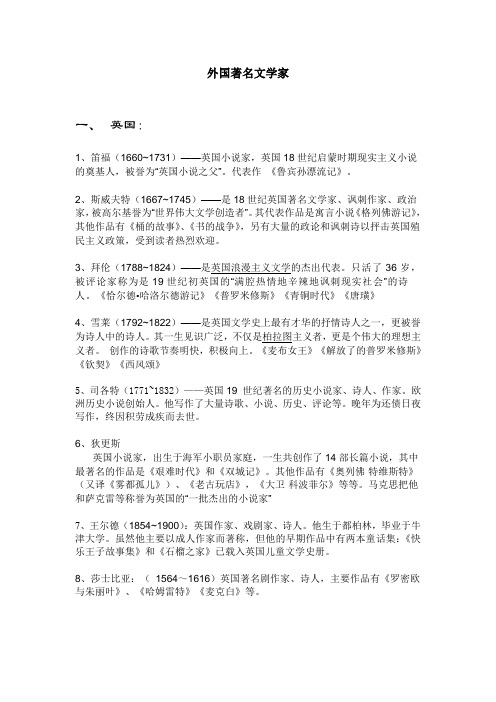
外国著名文学家一、英国:1、笛福(1660~1731)——英国小说家,英国18世纪启蒙时期现实主义小说的奠基人,被誉为“英国小说之父”。
代表作《鲁宾孙漂流记》。
2、斯威夫特(1667~1745)——是18世纪英国著名文学家、讽刺作家、政治家,被高尔基誉为“世界伟大文学创造者”。
其代表作品是寓言小说《格列佛游记》,其他作品有《桶的故事》、《书的战争》,另有大量的政论和讽刺诗以抨击英国殖民主义政策,受到读者热烈欢迎。
3、拜伦(1788~1824)——是英国浪漫主义文学的杰出代表。
只活了36岁,被评论家称为是19世纪初英国的“满腔热情地辛辣地讽刺现实社会”的诗人。
《恰尔德•哈洛尔德游记》《普罗米修斯》《青铜时代》《唐璜》4、雪莱(1792~1822)——是英国文学史上最有才华的抒情诗人之一,更被誉为诗人中的诗人。
其一生见识广泛,不仅是柏拉图主义者,更是个伟大的理想主义者。
创作的诗歌节奏明快,积极向上。
《麦布女王》《解放了的普罗米修斯》《钦契》《西风颂》5、司各特(1771~1832)——英国19 世纪著名的历史小说家、诗人、作家。
欧洲历史小说创始人。
他写作了大量诗歌、小说、历史、评论等。
晚年为还债日夜写作,终因积劳成疾而去世。
6、狄更斯英国小说家,出生于海军小职员家庭,一生共创作了14部长篇小说,其中最著名的作品是《艰难时代》和《双城记》。
其他作品有《奥列佛·特维斯特》(又译《雾都孤儿》)、《老古玩店》,《大卫·科波菲尔》等等。
马克思把他和萨克雷等称誉为英国的“一批杰出的小说家”7、王尔德(1854~1900):英国作家、戏剧家、诗人。
他生于都柏林,毕业于牛津大学。
虽然他主要以成人作家而著称,但他的早期作品中有两本童话集:《快乐王子故事集》和《石榴之家》已载入英国儿童文学史册。
8、莎士比亚:(1564~1616)英国著名剧作家、诗人,主要作品有《罗密欧与朱丽叶》、《哈姆雷特》《麦克白》等。
- 1、下载文档前请自行甄别文档内容的完整性,平台不提供额外的编辑、内容补充、找答案等附加服务。
- 2、"仅部分预览"的文档,不可在线预览部分如存在完整性等问题,可反馈申请退款(可完整预览的文档不适用该条件!)。
- 3、如文档侵犯您的权益,请联系客服反馈,我们会尽快为您处理(人工客服工作时间:9:00-18:30)。
英国文学English Literature主讲教师:田祥斌English LiteratureIn the 18th CenturyLecture VI. English Literature In the 18th Century⏹I.Historical Background⏹II. English Literature in this Period⏹ 1. Enlightenment (movement)⏹ 2. Neo-Classicism⏹ 3. The Beginning of Modern Novels ⏹ 4.Sentimentalism(literary current) ⏹ 5. Pre-Romanticism⏹ 6. Drama in the 18th centuryI. English Literature in the 18th Century⏹Historical BackgroundI.1 Period of a comparatively peaceful development in England⏹I.2 Two hostile parties: Whigs and Tories⏹I.3 Talented writers : servants of the two parties⏹1.4 Development of social life⏹I.5 A public movement: The EnlightenmentII. A General View of the Literature⏹II.1.1 Enlightenment (启蒙运动)⏹--The Enlightening was a progressive intellectual movement throughout Western Europe in the 18th century. It was an expression of struggle of the bourgeoisie against feudalism. The enlighteners fought against class inequality, stagnation, prejudices and other survivals of feudalism.⏹They thought the chief means for bettering the society was “enlightenment” or “education” for the people. The English enlighteners were bourgeois democratic thinkers. They were different from those of France, for they appeared not before but after the bourgeois revolution. They set no revolutionary aim before them, and what they strove for was to carry the revolution through to an end.⏹In their works, the writers criticized different aspects of contemporary England, discussed social problems, and even touched upon morality and private life. They intended to reform the social life according to a more reasonable principle, though this principle could never go beyond the limit of bourgeois interests.⏹Oxford Dictionary: The Enlightenment is the period in the 18th century in Europe when some thinkers and writers believed that reason and science, not religion, would advance human progress.⏹Longman Dictionary: The Enlightenment is the period in the 18th century in Europe, when certain thinkers taught that science and the use of reason would improve the human condition.⏹-- The problem of man comes to the fore in literature. The enlighteners refuse to accept the false religious doctrines about the viciousness of human nature, and prove that man is born kind and honest, and if he becomes depraved, it is only due to the influence of corrupted social environment. --- During the second greatest intellectual movement since Renaissance, the Enlighteners attacked the church power and the feudal system. The enlighteners believed in the power of reason, and that is why the 18th century in Europe hasbeen called "the age of reason."⏹启蒙运动是十八世纪全欧性的资产阶级反封建反教会的思想文化运动,是文艺复兴运动在新的历史条件下的继续和发展。
始于英国,形成于法国,影响全欧。
因为这场运动强调用理性启发人们的头脑,使人们摆脱蒙昧状态,因此有¡°启蒙¡±之名。
启蒙主义者攻击的主要目标是宗教迷信和专制制度。
以自然神论和无神论来批判和否定神权统治;以¡°自然法则¡±为依据,提出¡°自由,平等¡±的口号,否定专制制度和贵族特权。
⏹II.1.2 Characteristics of the literature⏹1) The main literary stream of the 18th century: realism⏹2) The main characters: common people⏹3) The main literary form: prose⏹4) The writing style: satire⏹5) Most of the English writers were enlighteners. The representatives of the Enlightenment were Joseph Addison and Richard Steele, the essayists, and Alexander Pope, the poet.⏹II.1.3 Three stages of the literature in the period.⏹18th century can be divided into three periods: neo-classicism (新古典主义), realistic novels, and sentimentalism (or pre-romanticism).II.1.4 Important writers and works⏹A. Important novelists:⏹1. Oliver Goldsmith (1728-1774)⏹奥利弗·哥尔斯密⏹(sentimentalist and enlightener, realistic novelist) ⏹The Vicar of W akefield ---novel (1766)⏹《威克菲尔德牧师传》⏹urence Sterne(1713-1768)罗伦斯·斯特恩(representative of sentimentalism, realistic novelist)⏹Tristram Shandy (1760-7) 《项迪传》⏹ A Sentimental Journey (1768)《感伤旅行》⏹3. Samuel Richardson(1689-1761)撒缪尔·理查生⏹(representative of sentimentalism)⏹Pamela (1740)《帕美拉》⏹Clarissa Harlowe (1747-8)《克莱丽莎·哈娄》⏹4. Daniel Defoe(1660-1731) 丹尼尔·笛福⏹famous enlightener and realistic novelist⏹Robinson Crusoe (1719)《鲁宾逊漂流记》⏹5. Jonathan Swift (1667-1745) 江奈生·斯威夫特⏹famous enlightener and realistic novelist⏹Gulliver‘s Travels (1726)《格利佛游记》⏹6. Henry Fielding(1704-1754) 亨利·菲尔丁⏹famous enlightener and realistic novelist⏹Tom Jones (1749)《汤姆·琼斯》⏹B. Important Poets⏹1. Alexander Pope(1688-1744)亚历山大·蒲柏⏹-- the representative of the neo-classical school.⏹Essay on Criticism(1711)《批评论》⏹2. Thomas Grey (1716-1771) 托马斯·格雷⏹Elegy Written in a Country Churchyard ⏹《墓园挽歌》1750⏹--a model of sentimentalist poetry⏹3. William Blake (1757-1827) romantic poet⏹威廉·布雷克⏹The Songs of Innocence (1789)《天真之歌》⏹The Songs of Experience(1794)《经验之歌》⏹4. Robert Burns(1759-1796) romantic Scottish poet. 罗伯特·彭斯⏹Poems, Chiefly in the Scottish Dialect⏹(1786⏹C. Important dramatist⏹Richard Brinsley Sheridan (1751-1816) ⏹理查德·谢立丹⏹The School for Scandal《造谣学校》⏹__Comedy⏹⏹The Rivals《情敌》II.2. Neo-Classicism in English Literature⏹II.2.1 Introduction⏹In early 18th century, writers of the neoclassical school were Addison, Steele and Pope. In the middle of the century, Samuel Johnson became the leader of the classical school in English poetry and prose.⏹They observed the three kinds of unity -- the unity of time, place and action.Neoclassicism 新古典主义⏹II.2.2 Major Writers of the Neo-Classical School⏹1) Joseph Addison (1672-1719)⏹约瑟夫·艾迪生__essayist⏹The Campaign《远征》— poem⏹Cato《加图》— play⏹2) Richard Steele (1672-1729)⏹里查德·斯梯尔—essayist⏹“Spectator” 《观众》或译《旁观者》⏹“The Tatler” 《闲话报》⏹Steel and Addison's contribution to English literature:⏹(1) Their writings shape a new code of social morality for the rising bourgeoisie.⏹(2) They give a true picture of the social life of England in the 18th century.⏹(3) The English essay had completely established itself as a literary genre. Their essays and stories gave an impetus to the development of the 18th century.⏹3) Alexander Pope(1688-1744) 亚历山大.蒲柏⏹“Essay on Criticism” (1711)《批评论》⏹He was the most important English poet in the first half of the 18th century.⏹His lines of poem are smooth,balanced and concise.⏹"I corrected because it was as pleasant to me correct as to write."⏹Pope also translated the Iliad and the Odyssey of Homer.⏹4) Samuel Johnson(1709-1784) 塞缪尔.约翰生⏹A. His life and position⏹ a. His father was a bookseller.⏹ b. physical deformity⏹ c. studied in Oxford without finishing his courses because of poverty ⏹ d. reading in his father’s shop⏹ e. Buried in poets’ corner in Westminster Abbey⏹ f. He is a lexicographer, critic, and poet.⏹B. His works:⏹ A Dictionary of the English Language⏹(1755)⏹Lives of the Poets《诗人传》——essay⏹V anity of Human Wishes《人类欲望的虚幻》----- poem⏹Rasselas《拉塞勒斯》----novel ⏹II.3 The Beginning of Modern NovelBeginning of the Modern Novels Daniel Defoe (1660-1731) •Daniel Defoe (1660 - 1731)丹尼尔.笛福⏹1) His life:⏹the son of a London butcher⏹a little schooling⏹supporter of "the Glorious Revolution" ⏹arrested and put in prison⏹developed a particular faculty of creative imagination.⏹Four facts: (See textbook, p188-9)⏹(1) Defoe had variety of occupations.⏹(2)He was radical non-conformist in religion.⏹(3) Defoe knew prison life.⏹(4) He was great in at least two occupations: journalism, authorship.⏹2) His position⏹He is the discoverer of the modern novel and has been called "Father of English and European Novels".⏹He is the first important novelist in English literature⏹His Robinson Crusoe was one of the forerunners of the English realistic novel.⏹3) His main works⏹Robinson Crusoe(1719)⏹Captain Singleton (1720) 《辛格顿船长》⏹---a novel of adventure⏹Moll Flanders (1722) 《莫尔.弗兰德斯》written in the form of autobiography⏹Colonel Jacque (1722)⏹A Journal of the Plague Y ear (1722)《大疫年日记》⏹In it he described the Great Plague of London.⏹Hymn to the Pillory《枷刑颂》--- a poem ⏹4) His masterpiece⏹Robinson Crusoe (1719) 《鲁宾逊漂流记》⏹a. Brief Introduction⏹Genre: novel⏹Author: Daniel Defoe⏹Type: romance of adventure⏹Time: 1651-1705⏹Place: on a desert island off the coast of South America⏹First published: 1719⏹Main characters:⏹Robinson Crusoe: Robinson Crusoe: a sailor, a merchant, a plantation owner, a 28 year isolation on a desert island, and a slave trader,narrator;⏹Friday:one savage, Crusoe's faithful servant, Friday becomes Crusoe’s servant after Crusoe saves his life when Friday is about to be eaten by other cannibals.⏹⏹b. Plot (see the textbook)⏹c. Image⏹the image of a true empire-builder, a colonizer and a foreign trader.⏹the courage and will to face hardships ⏹The author praises labor and man's efforts to conquer nature, but at the same time beautifies and defends the policy of colonialism of British government.A. A Brief Analysis of Robinson Crusoe(1) StoryIt is about Alexander Selkirk who once stayed alone on the uninhabited island Juan Fernandez for 5 years(2) Different levels of meaning(a) Adventurous story(b) Moral tale(c) Commercial account(d) Puritan fable.(e) Myth of modern civilization.(3) Theme:(a) It celebrates the strength of human rational will to conquer the natural environment.(b) Robinson is the very prototype of the empire builder, the pioneer colonist. His success was due to the sturdy qualities in his character, to his own unaided efforts, to his courage and patience, to his practical skill, and to his intelligent persistence.B. Features of his Novels(1) Picaresque tradition(2)Autobiographical form and first person narration(3) Journalistic style with great detail and specific time and space(4) LanguageDiction: plain, smooth, easy, direct, and colloquial but never coarseSyntax: long, rambling sentences without strong pauses to give his style an urgent, immediate, breathless quality, but the units of meaning are small and clear with frequent repetition so that the writing gives an impression of simple lucidity.⏹C. Defoe is remarkable for his novels.⏹1) The central idea of his novels is that man is good and noble by nature but may succumb to an evil social environment. The writer wants to make it clear that society is the source of various crimes and vices.⏹2) Defoe's intention is that the readers should regard his novels as real stories. For that reason, he avoids all art, all fine writing, so that the reader should concentrate only on a series of plausibleevents. Everything in the novel gives the impression of reality.3) IndividualismWealth-pursuing and wealth-accumulationSeeking personal profit4) Economic motivationTo leave home with the purpose of changing one’s fateTo seek profit is the only purpose in life; love has no place in a business man’s life.⏹Character analysis⏹1. Robinson Crusoe⏹-- perseverance⏹-- resourcefulness⏹-- independence⏹-- business instincts and his survival instincts⏹-- an ordinary sensible man⏹His flaws:⏹-- incapable of deep feelings.⏹-- generous to people, but very little tender or sincere affection⏹-- indifference to his wife⏹-- interested in possessions, power, and prestige⏹-- fascinating character of successes, failures, and contradictions of modern man⏹2. Friday⏹-- Non-white character⏹-- political symbol of racial injustice ⏹-- most vibrant character and much more charming and colorful than his master⏹-- emotional directness2. Jonathan Swift (1667-1745)江奈生.斯威夫特⏹A.His life:⏹Swift was born in Dublin. His parents were Englishmen. Before he was born, his father died.⏹He studied in Dublin University⏹the private secretary to Sir William Temple⏹regarded him as one of his slaves⏹The Battle of the Books,which is a satirical dialogue on the comparative merits of ancient and modern writers,⏹and A Tale of a T ub, which is a prose satire and a sharp attack on the disputes among the different sects of the Christian religion⏹independence and freedom⏹He wrote his masterpiece Gulliver's Travels.⏹His life was unhappy and miserable. He died of a brain disease in 1745.⏹⏹⏹B. Swift's position and his literary features⏹1) one of the greatest writers of satiric prose⏹2) one of the greatest masters of English prose: His language is simple,clear, and vigorous. And his concrete diction, uncomplicated syntax, economy and conciseness of language mark all his writings. He says: "Proper words in proper places makes the true definition of a style.”⏹3) writing in the capacity of a fictitious character⏹4) one of the realist writers⏹5) democratic ideas: Swift expresses democratic ideas in his works. This influences on later writers strongly.⏹C. His worksGulliver's Travels (1726)《格利佛游记》⏹1. Introduction: It is in four books.⏹Part One: Lilliput⏹Part Two: Brobdingnag⏹Part Three: floating island called Laputa satire on philosophers⏹Part Four: Houyhnhnms--horses--reason⏹Y ahoos-- his own countrymen⏹ A Tale of a Tub 《一个木桶的故事》1704.⏹It attacked religious ideas, and annoyed a large number of readers.⏹The Battle of Books《书的战争》—1704.⏹It is mainly an attack on pedantry in the literary world of the time. The reader is told the story of the Bee and the Spider. The two insects quarrel. The Bee represents ancient author. The Spider is like modern authors.⏹ A Modest Proposal《温和的建议》__ pamphlets, 1729Jonathan Swift⏹D. The Theme of Gulliver's Travels ⏹The novel criticizes and satires the reality of society. It is a satire on the eighteenth-century English society, touching upon the political, religious, legal, military, scientific, philosophical about almost every aspect of the society. Gulliver's Travels is a book simple enough for a child, and yet complex enough for an adult. To adult readers, it is more than a travel story.Jonathan Swift⏹E. Swift’s Satire⏹Swift is a master satirist, and his irony is deadly. But his satire is masked by an outward gravity, and an apparent calmness conceals his bitter irony. This makes his satire all the more powerful, as shown in his “Modest Proposal”. •Henry Fielding (1704-1754)亨利·菲尔丁⏹1) His Life⏹--Henry Fielding came from an aristocratic family and was well educated.⏹-- studied in Eton School; University of Leyden in Holland.⏹-- a versatile man: a novelist, dramatist, an essayist, a political pamphleteer, efficient magistrate and a political economist.Henry Fielding⏹-- Most of his dramatic works were satiric comedies. Fielding mercilessly exposed the corruption, hypocrisy and cruelty of the officials.⏹-- Then he studied law and was madea judge in 1748.⏹-- Fielding began a novel, “Joseph Andrews” (1742), as a kind of satire on Pamela.His novel Joseph Andrews begins as a parody of Pamela.⏹-- Joseph, Parson Adams, a simple, funny, and good-hearted priest.Henry Fielding⏹-- Samuel Richardson did not forgive him all his life.⏹-- Parody: a mocking imitation of the style of a literary work or works, often for humorous or satirical purpose, ridiculing the stylistic habits of an author or school by exaggerated mimicry.⏹-- Parody: Imitating something in sucha way as to make the original thing seem ridiculous (诙谐模仿).Henry Fielding⏹2)His position in English Literature ⏹(1) Fielding is the founder of English realistic novels.⏹(2) He has been rightly called the "father of the English novel"⏹As the founder of the English realistic novel, he set up the theory of realism in literary creation.⏹3)His main works⏹Tom Jones (1749)⏹Joseph Andrews (1742)⏹The History of Jonathan Wild the Great (1743)⏹Amelia (1752, his most somber novel)Henry Fielding⏹4) Brief introduction to his major novels⏹(1) Joseph Andrews⏹--Written in imitation of the manner of Cervantes--A burlesque of the false sentimentality and conventional virtues of Richardson's Pamela.-- The subject is “seeming and being”-- Joseph, brother of Pamela-- Lady Booby, aunt of Pamela's husbandHenry Fielding⏹(2) Tom Jones⏹or The History of Tom Jones, aF oundling,⏹Tom Jones appeared in 18 books⏹A) Questions and exercises⏹a. Explain why Fielding calls his novel Tom Jones, a “comic epic in prose”⏹b. What do you think of the novelist's intrusion as a technique of novel-writing?Henry Fielding⏹B) plot⏹C) Characters ⏹Tom Jones⏹-- a foundling⏹-- a handsome, upright, kind-hearted young man with minor shortcoming. He is frank and open, kind, generous, and, though quick-tempered, is devoid of malice.⏹--“good nature" and "goodness of heart".⏹Allworthy: a rich landlordHenry Fielding⏹Sophia⏹-- daughter of an neighboring landlord Squire Western⏹-- a tender, but courageous young woman⏹-- her father's "little darling”⏹-- "her father's word was a law”⏹Blifil⏹-- son of Allworthy's sister⏹-- an embodiment of vice⏹-- a symbol of hypocrisyHenry FieldingD. Theme-- A study of human nature●The bad, wicked man, like Blifil, has no hope of redemption.●The fundamentally good person like Tom, can be morally flawed, unwise or indiscreet, but still an admirable human being.Henry FieldingAnalysis of Tom-- honest, kind-hearted, high-spirited, loyal, and brave, but impulsive, wanting prudence and full of animal spirits, is Everyman.-- Being expelled from "Paradise Hall", he must through hard experience gain the knowledge of himself which will enable him to be united with the girl, Sophia, whose very name signifiesWisdom.5) Features of Fielding's Novels⏹(1) tell the story directly by the author⏹(2) Satire abounds everywhere in his works⏹(3) Fielding believed in the educational function of the novel. The novel is not only to amuse, but also to instruct.⏹(4) Fielding is a master of style, prose style. (5) The exact observation and study of real life was the basis of Fielding's work.⏹6)key points:⏹(1) Concerned with human nature, not moral virtue⏹(2) Country life vs. city life⏹(3) Man was not born perfect, should learn from experience to be perfect.⏹(4) Novel as a mock-epic poem (both theory and practice)II.4. Sentimentalism (感伤主义)(literary current)⏹Sentimentalism:⏹-- Sentimentalism is a literary tradition followed by some poets and novelists of the 18th century. In indulged in emotion and sentiment, which were used as a sort of relief for the grief and heart-aches felt toward the world's wrongs, and as a kind of mild protest against the social injustice. The writers who followed this tradition criticized the cruelty of the capitalist relations and the gross social injustices brought about by the bourgeois⏹revolutions and the Industrial Revolution. They yearned for the return of the patriarchal times. They thought the bourgeois society was founded on the principle of reason, so they began to react against anything rational and to advocate that sentiment should take the place of reason.⏹-- Sentimentalism is named after Sterne's A Sentimental Journey Through France and Italy. It is partly inspired by the emotional power of Samuel Richardson’s Pamela, or Virtue Rewarded (1740).⏹--The representatives of sentimentalism are Oliver Goldsmith, Laurence Sterne, Samuel Richardson and Thomas Gray.⏹Or: Sentimentalism is an emphasis on feeling, often expressed as excessive emotionalism in literature.1. Oliver Goldsmith (1728 - 1774)奥利弗.哥尔斯密⏹He is the outstanding representative of the sentimentalist school. His masterpiece is⏹The Vicar of Wakefield---novel (1766)⏹《威克菲尔德牧师传》⏹Type: sentimental legend⏹Time:18th century⏹Place: countryside in England⏹It is the story of good and virtuous family which has great misfortunes; but all comes⏹right in the end. The story is told by Dr. Primrose, the vicar, kindly and charitable with wife and five lovely children.⏹His novel appeals to human sentiment as a means of achieving happiness and social justice.2. Laurence Sterne (1713-1768)罗伦斯·斯特恩⏹(1)His life and position⏹--Sterne was born in Ireland. He was educated in Cambridge University. And became an author at the age of 46.⏹--He is the most outstanding figure of English sentimentalist school.⏹(2)His novels:⏹Tristram Shandy (1760-7)⏹--Tristram Shandy is Sterne's masterpiece and made him famous.⏹-- It is a strange, plotless novel.⏹⏹“A Sentimental Journey” (1768)⏹Sentimentalism is named after this work.3. Samuel Richardson (1689 -1761)撒缪尔·理查生⏹A. His position⏹He is one of the representatives of the sentimental school.⏹B. His main works⏹Pamela (1740)《帕美拉》⏹or Virtue Rewarded《美德受到奖赏》⏹-- a real novel written in the form of lettersSamuel RichardsonPamela-- A conflict between a lusty gentleman’s seduction and a virtuous servant woman’s resistance-- Lusty man admires the holy purity of a woman.-- A conflict between two sexes-- Victory for the moral principle-- Re-education of the gentleman-- A reformed rake makes the best husband.Samuel Richardson ⏹C. Pamela was a new novel in three ways:⏹(1) Pamela pictured the life and love of ordinary people.⏹(2) It's intention was not only entertainment but also moral instruction.⏹(3) It described not only sayings and doings of the characters but also their secret thoughts and feelings.Samuel Richardson⏹D. Three firsts:⏹(1) It is the first English novel in the modern sense.⏹(2) It is the first English psycho-analytical novel.⏹(3) It is the first epistolary novel. Samuel Richardson⏹Features of Richardson's Novels⏹(1) Richardson is the first novelist of sentimentalist tradition. His novels havea moral purpose.⏹(2) He is an outstanding novelist because he had much sympathy for women. He also exposed the moral hypocrisy of the society of his day.⏹(3) All of his novels are written in the form of letters. He was the master of writing epistolary novels.⏹Clarissa Harlowe(1747-1748)《克莱丽莎.哈娄》⏹This novel is regarded as his best. It is another epistolary novel. The novel consisting eight volumes tells us a tragedy of a young lady.4. Thomas Gray(1716-1771) 托马斯·格雷⏹(1) His life and position:⏹-- Thomas Gray was educated first in Eton. In 1734, he went to Cambridge University. In 1768 he was made professor of History and Modernlanguages at Cambridge.⏹-- the leader of the sentimental poetry of the day.⏹(2) His masterpiece:⏹Elegy Written in a Country Churchyard《墓园挽歌》1750⏹(3) Features:⏹-- a model of sentimentalist poetry.⏹-- His poems are characterized by an exquisite sense of form. His style is sophisticated and allusive.II.5 Pre-Romanticism in English Poetry ⏹1. William Blake (1757-1827) —poet ⏹威廉·布雷克⏹(1) His life and his position⏹--Blake was the son of a London tradesman. --He was a strange and imaginative child.⏹--He never went to school but learned to read and write at home. Blake is famous for his short lyrics. His poetry strikes us with its childish vision and simplicity.⏹(2) His works:⏹The Songs of Innocence《天真之歌》(1789)⏹The Songs of Experience (Including “Tyger” and “London”) (1794)⏹Poetical Sketches《素描诗集》⏹The French Revolution《法国革命》⏹American 《美国》⏹Milton《弥尔顿》⏹The Chimney-Sweeper⏹ A. Brief introduction⏹This is from The Songs of Experience. The short lyric contains chiefly the simple yet somewhat ironical speech of a boy chimney-sweeper as he describes his life of misery and its relation to "God and His Priest and King".⏹The language of the poem is concise, fluent, plain and with deep implication.2. Robert Burns (1759-1796)Scottish poet⏹(1) Burn's Life⏹-- He was born at Scotland, in a poor Scottish peasant's family in the winter of 1759 the eldest of seven sons.⏹-- In 1786, he printed "Poems, Chiefly in the Scottish Dialect" and got $20⏹(2) His position: He is the national poet of Scotland, a poet of the peasants. He is called a poet of the people.⏹(3) His poems⏹Chiefly in the Scottish Dialect 《苏格兰方言集》⏹The Tree of Liberty《自由树》⏹Scots Wha Hae《苏格兰人》⏹The Two Dogs《两只狗》⏹Holy Willie's Prayer《威利长老的祈祷》⏹My Heart's in the Highlands⏹《我的心呀在高原》⏹John Anderson, My Jo《约翰.安徒生》⏹ A Man's Man for a That《不管那些》⏹A Red, Red Rose⏹(4) Characteristics of his poems⏹-- Robert Burns is so-called Scottish "heaven-taught plowboy". His poem is well-marked rhythm.⏹-- Another characteristic is human emotions. Most of Burn's poems are lyrics, old Scottish songs and ballads.⏹-- He also wrote political lyrics on Scottish struggle for independence andon the themes of liberty, equality and fraternity.⏹-- He collected more than 300 popular ballads.II.6 English Drama in the 18th Century⏹Richard Brinsley Sheridan (1751-1816) ⏹理查德.谢立丹⏹The School for Scandal《造谣学校》⏹---Comedy⏹The Rivals《情敌》。
